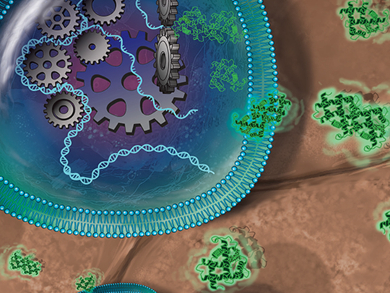Synthetic cells are artificial particles that can synthesize proteins from a DNA template autonomously. They contain the molecular machinery necessary for protein synthesis and need to be preloaded with the required template DNA, amino acids, and energy-supplying molecules. This cell-free protein synthesis (CFPS) offers a wide variety of applications because it can overcome the limitations of biological protein expressions. Even cytotoxic proteins can be synthesized. These proteins usually kill their host cell system before a significant level of expression is reached.
Avi Schroeder, Israel Institute of Technology, Haifa, and colleagues have developed a targeted drug-delivery system for the treatment of tumors that uses CFPS. Biologically active, cytotoxic proteins are produced by CFPS and released directly at the site of the tumor. The team encapsulated an Escherichia coli-based CFPS system inside lipid-based vesicles. An aqueous solution containing the CFPS system was pipetted into a mineral oil containing a vesicle‐forming lipid, 1‐palmitoyl‐2‐oleoyl‐sn‐glycero‐3‐phosphocholine (POPC), and cholesterol. Through several cycles of centrifugation, liposomes (vesicles) containing the CFPS system were formed.
This platform was used to synthesize a variety of proteins with molecular weights of up to 66 kDa and also successfully used to secrete Pseudomonas exotoxin A. The effectiveness of this therapeutic protein was shown in vitro as well as in vivo: when locally injected into a tumor in mice, the histological analysis indicates a robust apoptosis (death) of cancer cells.
- Synthetic Cells Synthesize Therapeutic Proteins inside Tumors,
Nitzan Krinsky, Maya Kaduri, Assaf Zinger, Janna Shainsky-Roitman, Mor Goldfeder, Itai Benhar, Dov Hershkovitz, Avi Schroeder,
Adv. Healthcare Mater. 2018, 7.
https://doi.org/10.1002/adhm.201701163




